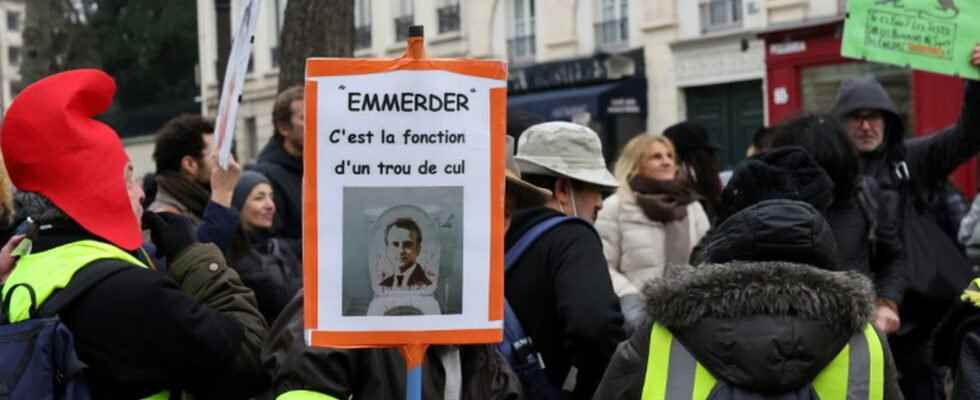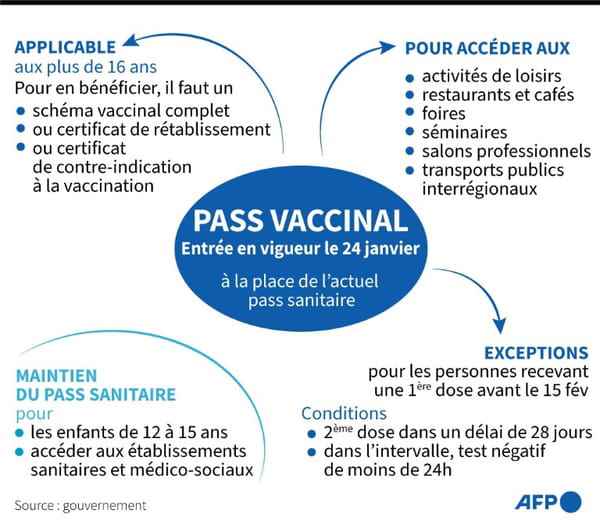In the wake of other European countries such as England and Denmark, the French government begins Wednesday to lift certain restrictions linked to Covid-19, a decision which divides in a context of a still tense health situation.
This relief for the daily life of the French comes a few hours after the announcement by the Pfizer-BioNTech alliance of the filing of an application for emergency authorization in the United States of its anti-Covid vaccine for children from six months to four years. A first for this age group.
If the United States Medicines Agency (FDA) gives the green light, it would add an additional layer of protection against coronavirus because it circulates particularly in educational establishments.
In French schools, only 4% of 5-11 year olds are vaccinated.
French President Emmanuel Macron has indicated that he wants, if the trends are confirmed, “to give visibility, when the school holidays return” in February / March, on “the reduction of school protocol”. The subject will be on the agenda Wednesday of a health defense council.
In the meantime, from Wednesday in France, wearing a mask is no longer compulsory outdoors, the gauges in places receiving the seated public (stadiums, cultural establishments, etc.) are abandoned and teleworking is no longer imposed. , but only recommended.
On February 16, nightclubs – closed since December 10 – will be able to reopen and standing concerts will again be authorized. Consumption at the counter will be possible in bars. Just like consumption in stadiums, cinemas and transport.
In Spain, nightclubs and other nightlife establishments will be able to reopen on February 11 in Catalonia, after almost two months of closure.
– Confined Tonga Islands –
Conversely, the Tonga Islands, which were for the moment one of the few countries to have been spared the virus, announced that they would enter confinement on Wednesday, after the detection of two cases of Covid-19.
The Norwegian government announced on Tuesday the end of most of its anti-Covid measures, believing that society could and should “live with the virus”.
Even if the Omicron variant has caused an outbreak of infections, this does not translate into an increase in hospitalizations for serious forms of the disease in a country where the population is very widely vaccinated.
Among the reductions taking effect from 11:00 p.m. (22:00 GMT) in Norway, the final restrictions on the sale of alcohol in bars and restaurants will be lifted: no longer need to be served seated or to order before 11:00 p.m.
Telework will no longer be compulsory, the recommended ceiling of guests that can be welcomed at home disappears, the same for the volume of public authorized in sporting events.
There is no longer any need to be tested at the border to enter Norway, nor to observe quarantine in the event of contamination of a relative – but a daily test is recommended for five days – and the period of isolation from an infected person falls six to four days.
– “Premature” to declare victory –
The director-general of the World Health Organization (WHO) warned on Tuesday that it was too early for countries to claim victory over Covid-19 or abandon their attempts to stem transmission of the virus.
“It is premature for any country to surrender or declare victory,” said Tedros Adhanom Ghebreyesus at a press conference, worried about rising deaths in most parts of the world.
WHO emergencies chief Michael Ryan has said he fears that some countries will – due to political pressure – want to emulate governments that are already easing measures, without taking into account their own health and coverage situation. vaccine.
In France, doctors are divided on the easing of restrictions. Some like Djillali Annane, head of the intensive care unit at Raymond-Poincaré hospital in Garches, near Paris. judge that “the circulation of the virus remains extremely high”, others that the “benefit-risk balance” leans rather in favor of the beginning of a return to normal life.
burs-elm/dth
All rights of reproduction and representation reserved. © (2022) Agence France-Presse

